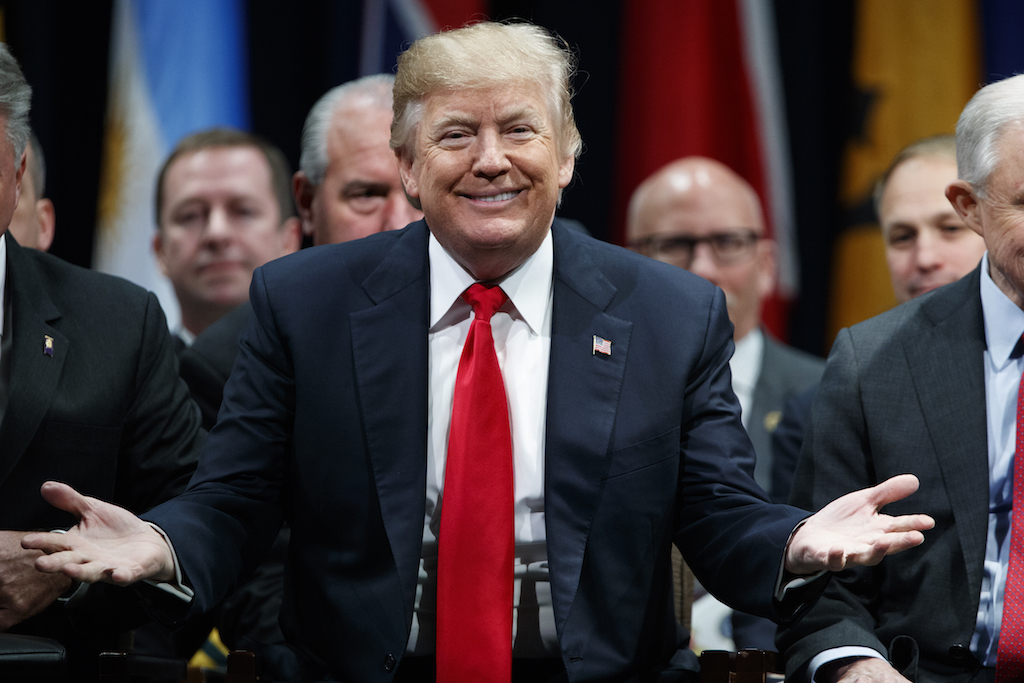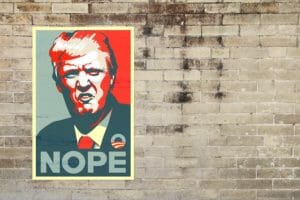An Unpatriotic Truth
President Trump's staggering perversion of history and facts presents a serious threat to American and global citizens. President Donald Trump. (Evan Vucci / AP)
President Donald Trump. (Evan Vucci / AP)
American fascists are most easily recognized by their deliberate perversion of truth and fact. — Henry A. Wallace, America’s 33rd vice president (1941-1945)
The American electorate is nearing the one-year anniversary of its ill-fated romance with Donald Trump. Still, we focus on frivolity.
Consider Trump’s remarks at the National Prayer Breakfast in February, days after his inauguration. While most of the media focused on Trump’s opening quip to “pray for the ratings” of his successor on “The Apprentice” (Arnold Schwarzenegger), something far more worrisome got overlooked: his shocking and dangerous misuse of history to justify his administration’s current and future policies. Time and again in Trump’s speech—and nearly all speeches since—the president eschewed context and complexity to tell a certain story.
Politically viable? Yes. Factual? Not in any way.
In his prayer breakfast speech, the president pivoted early into tribute and nonchalant appropriation of the sacrifice, faith and strength of our military service members. Standard material. It did not take long for falsehoods, fabrication and deleted context to appear. Trump quoted Thomas Jefferson on God and liberty. He mentioned nothing, of course, about Jefferson’s well-known deism and his rejection of the miracles and divinity of Jesus. A minor detail.
Being a prayer breakfast, plenty of talk centered on religious freedom and the Pilgrims—during a week when Trump had banned all migrants from seven Muslim-majority countries.
He asserted:
Faith in God has inspired men and women to sacrifice for the needy, to deploy to wars overseas and to lock arms at home, to ensure equal rights for every man, woman and child in our land. It’s that faith that sent the pilgrims across the oceans, the pioneers across the plains and the young people all across America, to chase their dreams.
In his rhetoric about America’s history of religious tolerance, he failed to note our darker record of nativism, racist immigrant exclusion acts or his own recent ban on (mostly) Muslim migrants. Furthermore, while the president extolled aplenty on the virtues of our Pilgrim and Puritan ancestors, he made no mention of their religious zealotry and suppression. Think Salem witch trials.
As is common, Trump overlooked our even earlier forbearers at Jamestown, Va. This venture amounted to little more than an aristocratic search for gold, funded by a corporate joint stock company. That sort of truth doesn’t fit the triumphalist narrative.
Similarly, his peculiar equation of westward-bound pioneers with religious tolerance ignores the greed, expansionist wars and near genocide of Native Americans, which composed the murkier side of Manifest Destiny.
Of course, Trump defended his bans in the name of “security.” He didn’t dare mention the irony of his two foreign wives and German-immigrant grandfather. We heard nothing about accepting the world’s “tired, poor, huddled masses.” We received no explanation of the irrational and empirically incorrect claim that his travel ban would make us safer. As CNN commentator Fareed Zakaria noted, none of the citizens of the initial seven chosen countries had killed a single American on U.S. soil between 1975 and the present. Conversely, thousands of Americans died at the hands of Egyptians and Saudis—both absent from the list. Again, no explanation.
Trump does not bother to question whether more military action in the Middle East reduces terrorism. It does not. The Department of State counted just 348 worldwide terrorist attacks in 2001, compared with 11,774 such attacks in 2015. That’s right. At best, America’s 16-year war on terror has failed to reduce international terrorism. At worst, our actions have made matters worse. Statistics aside, the president also failed to elucidate the human tragedy of his ironic defense of a Muslim travel ban in the midst of a religious freedom-themed speech.
Take just one anecdotal example among thousands: my Iraqi interpreter Akeel, who risked his life working for the U.S. Army for seven years before receiving a visa. Akeel barely escaped Iraq alive. He invested every dollar (of blood money) he earned in a new house in Baghdad for his brother’s family. And—at least in travel ban 1.0—Akeel’s family could not visit him in the United States. Their crime was being Muslims from a Muslim country.
Later in the speech, Trump proudly noted how President Eisenhower added the words “under God” to the Pledge of Allegiance. The president called this addition “a great thing,” but once again left us devoid of context. He failed to describe the Cold War framework of Ike’s decision or ask why, if we were born a “Christian nation,” it took until 1954 for this late addendum. I suppose we should not be surprised that Trump deleted all mention of past manipulations of America’s contrived Christian homogeneity to suppress free speech and dissent, especially during the 1950s-era Red Scare.
Next, the president treated listeners to an exploration of his favorite topic: the evil of Islamic State and his own tough stance to forever bury radical Islamic terrorism. This time, he chose an alarmist focus on the savage tactics of Islamic State. Trump described in sensational detail: “We have seen a campaign of [Islamic State] and genocide against Christians, where they cut off heads. Not since the Middle Ages have we seen that. We haven’t seen that, the cutting off of heads.”
But is this true?
Look, Islamic State is a savage organization, but even Trump’s rhetoric is littered with exaggeration and untruths. Beheading is not new or unique. The French Revolution’s guillotine produced thousands of victims, centuries after the Middle Ages. More to the point, beheadings remained an official method of execution in Great Britain until 1747, Norway until 1905, Germany until 1938 and France until 1977. Furthermore, our Saudi allies and longtime oil suppliers continue beheading men and women to this very day, including 153 decapitations in 2015 alone. Any surprise that Trump failed to mention Saudi Arabia in his speech or to include it in the travel ban?
Besides, why all the panic about the method of killing? What is the moral difference between beheading religious opponents and incinerating a few hundred thousand Japanese women, children and old men from the sky—as our own pilots did in 1944-45? As an assistant professor of history at West Point, I asked my cadet students that question every semester and learned to expect horrified gasps from some.
But let us pose it again: Why the obsession with Islamic State’s killing method? Fear. That’s why. Fearmongering quells dissent and stokes Americans’ basest instincts, leaving little room for critical analysis. And why not? The strategy worked in the 2016 campaign.
To close his prayer talk, the president shifted to a solemn promise regarding these Islamic State “barbarians” and made a bold assertion: “Terrorism is a fundamental threat to religious freedom. It must be stopped, and it will be stopped. It may not be pretty for a little while. It will be stopped.”
That’s one heck of a proclamation. Is such total victory even possible?
That’s not the point. Such vague and improbable promises require use of the confident historical mythmaking that litters all Trump’s speeches. Such innocuous phrases as “it may not be pretty for a while” serve their frightening purpose. They gloss over myriad ugly futures (torture, illegal rendition, religious loyalty tests and extrajudicial assassinations) and usher in values antithetical to the very “freedoms” his deceitful speeches espouse.
Trump’s promises to “stop terrorism” include few details, no weighing of costs—whether in dollars, dead soldiers or (dare I mention) civilian collateral damage. This administration wants you to believe the public can’t know the plans, lest we ruin the surprise for our enemies. But after 16 years of war—replete with invasions, bombings, occupations, counterinsurgencies, drone strikes, commando raids and humanitarian projects—shouldn’t we be skeptical?
To be fair, Trump is not alone in his off-the-cuff distortion of American history. President Reagan famously and repeatedly told a story about a World War II pilot who rode a crippled bomber into a fiery death rather than leave behind a wounded gunner. Reagan sought to evoke the power of military loyalty and of the American character. The only problem is that no such event ever occurred, and the story bore remarkable resemblance to a fictional account from Reader’s Digest.
President Obama also was not exempt from misleading historical narratives. Some people accused him of misusing a famous Martin Luther King Jr. quote to “bless a whole range of political solutions.”
But Trump has upped the ante, exhibiting a lack of command of history—and the English language—like few commanders in chief before him.
Most Americans ignore Trump’s casual errors and deliberate untruths that cloud even cursory understanding of this country’s past. And they do so at their peril. History helps citizens define national identity and informs decisions and policies. The stories we tell shape collective culture and influence contemporary judgments.
The president’s historical errors and reckless oversimplifications during his National Prayer Breakfast speech—and every day since—are manifold. This revisionist history contradicts near consensus on most of these issues among serious scholars. That’s the problem. No one reads academic books. The shame is that most scholars write and speak only to a peer audience, shrouded in the same social and professional echo chamber. This is why writers have a responsibility to call out deliberate falsification and the misuse of history for political ends.
In Trump’s world, myths and “alternative facts” replace verifiable truth, prudence or any sense of humility. The impossible becomes the certain. “Believe me,” he assures us. Americans must reject this. Citizens deserve to know the strategy. In fact, we must demand it.
Our country sends soldiers—volunteers all of them—to fight and die at the whim of its presidents. For the sake of the soldiers, to say nothing of the victims, plans deserve a public hearing and debate by our elected representatives. Sixteen years of war, multiple combat deployments, 7,000 dead American soldiers and perhaps 1 million local deaths ought to have earned the populace at least that much.
Either the president or his speechwriters don’t know the historical complexity of these issues, or they manipulate the past and omit context to craft a useable narrative for their favored course. Which is worse? As filmmaker Albert Maysles said, “Tyranny is the deliberate removal of nuance.”
One may call these warnings alarmist. Some will call them unpatriotic. Others can ignore such admonitions, channel surf and download the newest iPhone distraction.
But remember, the extremists count on your complacency.
So think, study, read and question. Be a citizen. And when they begin to question your patriotism, you just might be on to something.
It’s called truth.
The views expressed in this article are those of the author, expressed in an unofficial capacity, and do not reflect the official policy or position of the Department of the Army, Department of Defense or the U.S. government.
Your support matters…
Independent journalism is under threat and overshadowed by heavily funded mainstream media.
You can help level the playing field. Become a member.
Your tax-deductible contribution keeps us digging beneath the headlines to give you thought-provoking, investigative reporting and analysis that unearths what's really happening- without compromise.
Give today to support our courageous, independent journalists.




You need to be a supporter to comment.
There are currently no responses to this article.
Be the first to respond.